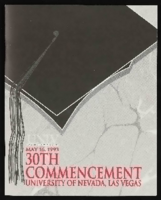Search the Special Collections and Archives Portal
Search Results

LeMoyne Legere interview, March 17, 1977: transcript
Date
Archival Collection
Description
On March 17, 1977, collector Cecilia Branch interviewed LeMoyne Legere (born in 1935) at her residence in Las Vegas, Nevada. In this interview, Mrs. Legere discusses various differences in Las Vegas from the time she was growing up to the date of the interview. She also discusses her involvement in high school and what people do for recreation.
Text

Transcript of interview with Mae Farei by Martha Jane Cunningham, February 24, 1980
Date
Archival Collection
Description
On February 24, 1980, Martha Cunningham interviewed her aunt, Mae Farei (born 1909 in Illinois), about her experiences living in Nevada. Farei first talks about the development of the Downtown and Strip areas. She then discusses work at the Twin Lakes Lodge and Stardust as a housekeeper, and she later mentions some of the recreational activities available to those in Nevada. She also mentions the importance of Nellis Air Force Base and expresses her appreciation for living in Southern Nevada.
Text

Transcript of interview with Dr. Holbert H. Hendrix by Keith Thomas, February 20, 1979
Date
Archival Collection
Description
On February 20, 1979, Keith Thomas interviewed Dr. Holbert H. Hendrix (born 1914 in French Lick, Indiana) about his life in early Las Vegas, Nevada. The interview takes place at the University of Nevada, Las Vegas in Room 312 of the Education Building. Dr. Hendrix first discusses his personal background and interests, as well as his occupational background in teaching. The two discuss changes at the University of Nevada, Las Vegas, including construction, when the university began awarding degrees, and Dr. Hendrix’s reasons for moving to Las Vegas. Dr. Hendrix then describes changes to the Strip and how the hotel industry has changed since he first arrived in Nevada. The two briefly discuss how problems with prostitution may have increased since Dr. Hendrix arrived in Nevada. The interview concludes with Dr. Hendrix contemplating new problems that may arise in Las Vegas as a result of an expected population boom and his hopes that the Nevada state government would invest more into funding for education.
Text

Thelma Jenkins interview, October 15, 1985: transcript
Date
Archival Collection
Description
On October 15, 1985, collector Lynn Ballard interviewed Thelma Jenkins (born June 10th, 1923 in Paragonah, Utah) at her home in Henderson, Nevada. In this interview, Thelma Jenkins discusses her career in nursing as well as the differences in the various positions she’s worked. She also talks about attending various conventions and her membership in the Nevada Nurses Association.
Text

Transcript of interview with Juanita Kilburg by Vincente C. Camacho, March 7, 1981
Date
Archival Collection
Description
On March 7, 1981, Vicente C. Camacho interviewed accounting clerk, Juanita Kilburg (born September 25th, 1923 in Los Angeles, California) on the second floor of the UNLV Dickinson Library. Kilburg explains how her family first moved to Southern Nevada and her father’s ties to the railroad. She then goes on to explain the growth of the military and Nellis Air Force Base. The interview concludes with a discussion on her work with the American Legion service organization.
Text

Transcript of interview with Bruce M. Eaton by Jay Brewer, April 24, 1975
Date
Archival Collection
Description
On April 24, 1975, Jay Brewer interviewed Bruce M. Eaton (born 1904 in Toronto, Kansas) about his life in Nevada and more specifically on the growth of Boulder City. Eaton first talks about his family’s move to Nevada and his work as a laborer for Six Companies during the construction of the Boulder Dam and his eventual employment with the Bureau of Reclamation as a general foreman. He also talks about the work conditions on the Boulder Dam, including the protection by Army personnel during the time of World War II. Eaton also describes the details of a federal investigation involving Eaton, a case of suspected espionage, and some of the racial conflicts that existed at the dam. Eaton then discusses his enlistment into the United States Navy and the incident that led him to be medically discharged before a deployment. He then describes the role of several Nevada legislators in helping the growth of Boulder City and his interactions with them. Eaton then discusses his role as city manag
Text

Transcript of interview with Elbert Edwards by Layne Covington, October 16, 1986
Date
Archival Collection
Description
On October 16, 1986, Layne Covington interviewed Elbert Edwards (born 1907 in Panaca, Nevada) about his life in Southern Nevada. Edwards first talks about his family background before talking about what it was like to live in Panaca. He then talks about changes in Southern Nevada, particularly those in Boulder City that have taken place over time. Edwards later talks about the work of his wife and both of their political involvement and his involvement and career in education. The latter part of the interview includes discussion of the building of Boulder Dam, Edwards’ job as a registrar in the Selective Service, and the effects that the war years had on Las Vegas.
Text

University of Nevada, Las Vegas (UNLV) 30th commencement program
Date
Archival Collection
Description
Commencement program from University of Nevada, Las Vegas Commencement Programs and Graduation Lists (UA-00115).
Text

June Monroe and Kazuko Atomura oral history interview: transcripts
Date
Archival Collection
Description
Oral history interviews with June Monroe and Kazuko Atomura conducted by Cecilia Winchell and Stefani Evans on July 14 and July 19, 2022 for Reflections: the Las Vegas Asian American and Pacific Islander Oral History Project. In the first interview, Kazuko Atomura describes her childhood in Taiwan and Tokyo, Japan, and shares both happy and difficult mememories of that time. Atomura eventually moved to Los Angeles, California, where she reconnected with a man she previously met in Japan. She married him and together had their daughter, June Monroe, and another son while living in Corpus Christi, Texas. After difficult medical procedures involving Atomura's husband and Monroe's younger brother, Brian, the family relocated to Las Vegas, Nevada. Monroe recalls attending Las Vegas High School and Bonanza High School, and the struggle of making new friends as a young person. In the second interview, the mother and daughter discuss racism, discrimination, and identity. Kazuko Atomura recalls her many experiences with discrimination as a result of both her appearance and language barriers. June Monroe discusses how she came to be proud of her Japanese heritage, while Atomura discusses some of the community activities she has been involved in since living in Las Vegas including the Japanese Culture Club and odori dancing. Then, both Atomura and Monroe discuss Monroe's brother, Brian, who received two kidney transplants; one from Monroe's father and one from Monroe herself. Atomura talks about the shrines she has built for Brian, the experience of him being on dialysis, care taking, and his final days. Monroe shares about her activism with organ donation, being regularly involved with the Nevada Donor Network and helping to pass significant pieces of legislation within the area of organ donation.
Text

Brad Jerbic and Tom Perrigo oral history interview: transcript
Date
Archival Collection
Description
Oral history interview with Brad Jerbic and Tom Perrigo conducted by Claytee D. White on June 26, 2019 for the Remembering 1 October Oral History Project. Brad Jerbic and Tom Perrigo share their experiences working with landscape architect Jay Pleggenkuhle to create the Healing Garden of Las Vegas after the October 1 shooting. They discuss how the community was in need of a place to mourn and heal after the tragedy, and how imperative it was for the space to be constructed quickly. Brad and Thomas share how the garden was constructed in four days and the various members of the community who helped to make it possible.
Text
